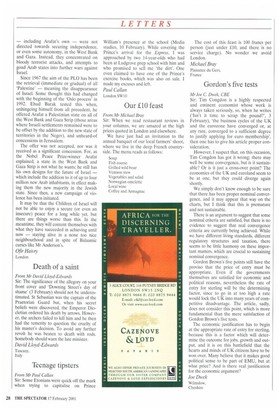Gordon's five tests
Mr Joe C. Dwek, CBE Sir: Tim Congdon is a highly respected and eminent economist whose work is always taken seriously, so, when he writes (Isn't it time to scrap the pound?', 3 February), 'the business cycles of the UK and the eurozone have converged or, at any rate, converged to a sufficient degree to justify applying for euro membership', then one has to give his article proper consideration.
However, I suspect that, on this occasion, Tim Congdon has got it wrong; there may well be some convergence, but is it sustainable? Or is it just a cross-over point? The economies of the UK and euroland seem to be at one, but they could diverge again shortly.
We simply don't know enough to be sure that there has been proper nominal convergence, and it may appear that way on the charts, but I think that this is premature and not sustainable.
There is an argument to suggest that some nominal criteria are satisfied, but there is no evidence to suggest that real convergence criteria are currently being achieved. While we have different living standards, different regulatory structures and taxation, there seems to be little harmony on these important matters, which are crucial to sustaining nominal convergence.
Gordon Brown's five points still have the proviso that the price of entry must be appropriate. Even if the governments themselves are satisfied for economic and political reasons, nevertheless the rate of entry for sterling will be the determining factor, since to go in at too high a rate would lock the UK into many years of competitive disadvantage. The article, sadly, does not consider this point, which is more fundamental than the mere satisfaction of Gordon Brown's five tests.
The economic justification has to begin at the appropriate rate of entry for sterling, because this is a factor which will determine the outcome for jobs, growth and output, and it is on this battlefield that the hearts and minds of UK citizens have to be won over. Many believe that it makes good political sense to be part of EMU, but at what price? And is there real justification for the economic argument?
Joe Dwek
Wilmslow, Cheshire


































































 Previous page
Previous page